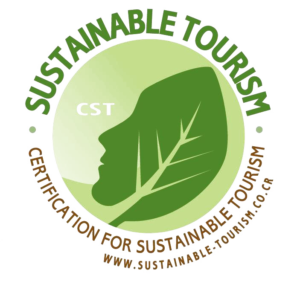Sustainable Tourism
Those tourist activities which respect the natural, cultural and social environment, and the values of a community, that allows enjoying a positive exchange of experiences between residents and tourists, where the relationship between the tourists and the community is fair and benefits are distributed fairly and where the tourists have true travel experience.
We must ensure the least possible impact on the environment, and the local culture generating income and employment for the inhabitants of the town, this is called sustainable tourism.

What is the 'CST'?
Certification for Sustainable Tourism
Certification for Sustainable Tourism is an acknowledgment that the Costa Rican Tourism Institute bestows on companies that meet the guidelines of the program at different levels.
CST is regulated by a National Accreditation Commission and consists of a scale of 2 “levels” of sustainable tourism achievement.
The levels are Basic and Elite, being Basic with the lowest rating and Elite with the highest score.
The CST was designed to categorize and differentiate tourism companies according to the degree to which they fit a pattern of sustainable management of natural, cultural and social resources.
Every two years the Costa Rican Tourism Institute will conduct a re-evaluation to ensure compliance and improvement of the aspects evaluated. Physical-Biological Environment, Service Management, Customer and Socioeconomic Environment are among the factors evaluated.
Costa Rica Top Tours is Elite level.
As you plan your journey, choose suppliers that offer guarantees of quality and respect for human rights and the environment.
- Use natural resources such as water and energy, with moderation.
- Try to minimize the generation of waste. They are a source of pollution.
- When you have to get rid of waste, do it in the best possible way to facilitate its destination.
- In any natural space please try that the only mark you leave behind is from your footprint.
- If you visit sensitive ecosystems such as jungles, forests or coral reefs, check with your guides on how you can cause the least possible impact in order not to degrade them.
- When you buy gifts and souvenirs, look for products that are manufactured locally. You will be helping to strengthen our economy.
- Do not purchase any wildlife protected by the Convention on International Trade in Endangered Species of Wild Fauna and Flora (CITES), or products derived from these species. It is a crime and it contributes to their extinction.
- Enjoy knowing the culture, customs, cuisine, and traditions of our local populations. Respect them and get close to them, you will enjoy it.
- Contribute with your presence to the development of responsible and sustainable tourism, building a healthy and solidary planet with your trip.
Integrate to cultures and traditions different from your own and your experience will be transformed, you will earn the respect of the local population, and they will welcome you more easily. Be tolerant and respect diversity; observe the traditions and the social and cultural practices of each area.
Respect human rights. Any form of exploitation is an infringement of the fundamental aims of tourism. Child sexual exploitation is an offense punishable both in the place where it is carried out as in the country of residence of those who commit it.
Help to conserve the natural environment. Protect the flora and wild fauna and their habitat: don’t buy products made from endangered plants or animals and remember that in Costa Rica the Wildlife Conservation Law punishes with severe fines and/or jail it’s marketing.
If a hotel has the policy to minimize the laundry of sheets and towels, try to support it. Remember to turn off the lights and air-conditioning when you leave the room. Try not to waste water when you are not using it.
Respect the cultural resources. Tourist activities must be practiced with respect for the artistic, archaeological and cultural heritage.
Your trip can contribute to economic and social development. We advise you to buy handicrafts and local products to support the economy of the place and adhere to the principles of fair trade.
Collect all possible information about your destination, and take time to understand their customs, norms, and traditions. Avoid any behavior that may offend the local population.
Read the legislation in force in order not to commit any acts deemed criminal in the country visited. Do not deal with drugs, weapons, antiques, protected species, nor products or substances dangerous or prohibited by national regulations.
In Costa Rica Top Tours we protect our children, girls, and youth. We remind you that the sexual exploitation of children is a crime punishable by law.
When you visit National Parks or Protected Areas
Ideally, hire a local certified guide, they will facilitate your visit and your interpretation of the natural areas, it is easier for them to find animals that are not visible to visitors.
It is recommended not to feed, touch or disturb the animals. Avoid putting yourself at risk.
It is recommended to follow the trails at all times, try to reduce the impact on forests and avoid getting lost in the non-delimited areas.
Moderate the tone of your voice to not disturb your surroundings.
Look at where you’re walking, this is important when you are outdoors, when you want to stop and look at any plant or animal, please be careful to avoid any accidents.
It is recommended to choose the appropriate clothing according to the climate and surroundings.
Note: If you cannot hire a local guide, it is important to consult with officials from each of the conservation areas about the general rules and guidelines to follow not to jeopardize your visit.





